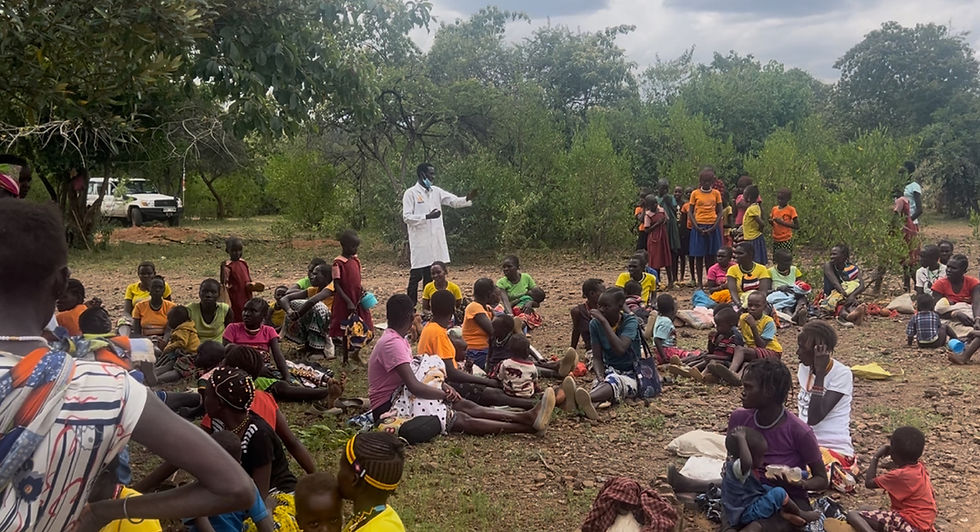Sensitive Intention, Sensitive Intervention
- Alex Chang
- Nov 13, 2023
- 4 min read
September 22, 2023
Sun rays stained my hand as I stuck my hand out the car window, feeling the lukewarm draft that I could almost catch. It was the second journey Mwatela and I were making that week into the far reaches of East Pokot. As part of our initiative to introduce new technology to provide cold chain lab and vaccine transport, we first conducted a preliminary assessment of the needs and capabilities of healthcare facilities.
Our mantra was ‘sensitive intention, sensitive intervention.’
Perhaps this was a mindset I had formulated even prior to accepting this co-op with ACCIH. My previous medical experiences working in Israel/Palestine had instilled within me the understanding that passionate care requires native eyes. To care naturally for a people, it is imperative to bear witness to their struggle through their own eyes. Superimposing the way you think you can help over what a community actually needs is a dangerous mindset, completely belittling the most vital perspective: the eyes of the community.
Navigating through the brush, our tire marks imprinted the landscape, passing dried watering holes, the occasional solar panel, and the mud houses, latticed with wood, of the Pokot.
We finally arrived at Akwichatis Health Centre where we met with the nurse, Peter, who was singlehandedly carrying out all services of the facility that day. Patients stringed the blue benches of the hospital, sporting the football jerseys and feathered fedoras I had become accustomed to, though the nurse stayed composed and professional despite his workload.
“Are you the only one here today?” I questioned Peter as he documented a malaria screening he had just completed.
“Yes,” he replied, “We have three rotating nurses, but I have been here for the past two weeks.”
And yet they are one of the sole providers of healthcare for villages up to sixty kilometers away. One of the most striking realizations I’ve made in surveying these healthcare centers was how vast their catchment area was compared to their size and resources. The dedication and responsibility motivating these healthcare workers to serve their community continues to move me.
Interviewing Peter, we found that while their solar panels were functioning, their medical-grade fridge had been out of service. We surveyed their average influxes of patients, outreach campaigns, and capacity for laboratory diagnostic services.
“Do you think our technology would be beneficial for your patients?”
This was the most important question we asked that day. In the past months, we have documented a severe influx of patients with suspected visceral leishmaniasis specifically from the regions served by Akwichatis and Riongo Health Centres. The nurse explained that the combination of severe understaffing and lack of diagnostic tests curbs the capacity of the health facility to comprehensively serve its community. Although HIV and malaria screens are done, he often finds himself referring patients to larger facilities, like Riongo Health Centre and Chemolingot Sub-County Hospital (CSCH), which have laboratory capabilities. The caveat is distance—both health centers are almost three hours away on unpaved roads. We suspect that travel distance hinders the willingness of patients to seek proper care, and he concluded that using our technology to transport samples to more advanced facilities rather than referring patients would greatly improve the capacity for differential diagnosis, simultaneously expanding accurate care.
The next moments confirmed this conclusion.
Following the interview, Peter examined a patient who was suffering from chest pain. My previous experience as an EMT taught me that this could be something as benign as gastric reflux, or as serious as a myocardial infarction. More emergently, this patient was pregnant, and she was worried that her illness would affect her unborn child. Luckily, he borrowed the pulse oximeter I had brought that day and used a stethoscope to perform a brief chest exam. After taking her history, he concluded that she was most likely feeling gastric reflux from the tea she had that morning, made more complicated by a common cold she had been suffering. Peter translated that she had a history of feeling gastric reflux, especially after drinking tea on an empty stomach. Sometimes, pieces of the story are all there—it’s the responsibility of healthcare workers to stitch it together. Though the preliminary exam revealed a nonemergent condition, Peter still advised her to seek more advanced care. The diagnostic tests available at Akwichatis Health Centre were not sufficient to confirm that there were not any other severe, underlying conditions, and that her illness did not affect her unborn child. Her options were a medical outreach close by that may be able to provide an impromptu field diagnostic or ride with us for four hours to CSCH for a more accurate examination. She eventually opted for the closer medical outreach, yet I still felt torn as the healthcare facility did not have the tools to give her the diagnosis she needed.
It was the testimonies of local healthcare providers and firsthand experiences that showed me the real need for interventions such as the refrigerated backpacks that we are introducing. As Edward, a lab technician from Kolowa expressed, he believes that our project is a ‘game-changer’ for the expansion of medical diagnosis into fragile contexts. I am constantly motivated by the promise and excitement that our healthcare providers have in our project, and hope that we can enact both a positive impact in the coming months that I am here, as well as lasting change within East Pokot.
Patients await medical care at Akwichatis Health Centre.

Alex writes down notes as he and the facility nurse, Peter, perform a capacity assessment of Akwichatis Health Centre.





Comments